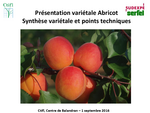Presentation of Apricot Varieties
Every other year, as part of its missions of experimentation and dissemination of information, Ctifl organises at its Balandran research centre a commented presentation of apricot varieties, in order to summarise the technical data on the new selections available. Those presentations are given in the framework of the French charter for the study of fruit varieties, signed between FNPF (growers), CEP (nurseries), INRA (fundamental research), Ctifl, and regional experimental stations, and coordinated by Ctifl regarding the study of behaviour.As with other species, varietal innovation remains a main asset for the success of an apricot orchard. It allows to constantly adapt the offering in order to meet consumer requirements.
The information supplied during the presentations consists of objective data, which take into account the behaviour of each variety in the orchard and post-harvest.
The comments on each variety mainly concern the following points:
- ripening date and position compared to the control varieties,
- characteristics of the tree: habit, fruiting type, period of bloom, self-fertility, thinning intensity, etc.,
- agronomic potential (yield, distribution of fruit size),
- aspect of the fruit, gustatory potential (Brix, acidity and aromatic potential),
- susceptibility to pests and diseases.
The presentations are intended for all operators in the sector, both on the production side (growers, technicians, nurseries/patent representatives …) and in the distribution channels (marketers, supermarkets …).
Documents

|
Apricot power point presentation - 1st sept 2016 () Power point presentation |
Details
- Activity type
- Final project conference participation with presentation (oral)
- Activity work package
- Performance of new fruit varieties
- Activity number
- CTIFL-WP2-A8
- Activity contact
- Christian Hilaire (Ctifl) - [email protected]
- Activity partner
- CTIFL
- Activity country
- France
- Last edit
- 09-04-2018

The EUFRUIT thematic network has received funding from the
European Union's Horizon 2020 research and innovation programme
under grant agreement No 696337.
European Union's Horizon 2020 research and innovation programme
under grant agreement No 696337.